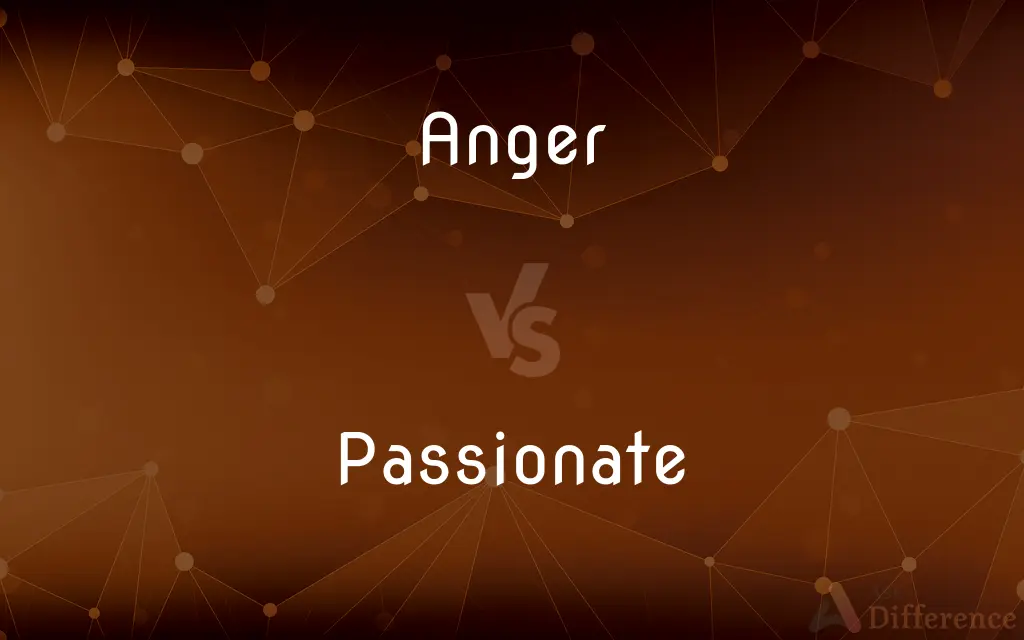Anger vs. Passionate — What's the Difference?
By Maham Liaqat & Fiza Rafique — Updated on March 31, 2024
Anger is an emotional response to perceived wrongs or frustration, while being passionate involves intense, positive feelings towards an interest or activity.

Difference Between Anger and Passionate
Table of Contents
ADVERTISEMENT
Key Differences
Anger is a powerful emotion that arises in response to irritation, injustice, or threat, often leading to a desire for revenge or to address the source of the anger. It is typically viewed as a negative emotion because it can lead to aggressive behaviors or conflict. In contrast, being passionate refers to having a deep enthusiasm or zeal for something, whether it be a hobby, cause, or aspect of one's work. This intensity is generally seen as positive, driving individuals to pursue their interests with dedication and energy.
While anger can cloud judgment and lead to impulsive actions, passion fuels creativity, motivation, and perseverance. Passionate individuals are often admired for their commitment and ability to inspire others, whereas anger can isolate individuals and damage relationships. The outcomes of these emotions highlight their differences: passion often leads to achievement and personal fulfillment, while unchecked anger can result in regret and negative consequences.
It's important to note that both emotions are strong but direct energy in different ways. Anger can be a catalyst for change when channeled constructively, pushing individuals to address injustices or personal grievances. Similarly, passion can become overwhelming or lead to burnout if not managed properly, demonstrating that both emotions, despite their differences, require balance and mindfulness to be beneficial.
The contexts in which anger and passion arise also differ significantly. Anger often results from external stimuli or situations that are perceived as harmful or unfair, whereas passion grows from an internal drive or a profound interest in a specific area. This distinction highlights how external circumstances versus personal values and interests can influence emotional responses.
Despite their differences, it's possible for anger and passion to coexist or intersect. For example, one might feel angry about a particular social issue, which fuels a passionate commitment to activism or advocacy. This interplay shows that while anger and passion are distinct, they can both be powerful motivators for action when aligned with personal values and goals.
ADVERTISEMENT
Comparison Chart
Nature
Reactive, often negative emotion
Proactive, positive emotion
Trigger
Perceived wrongs, frustration, injustice
Interest, enthusiasm, love for something
Impact
Can lead to conflict, aggression
Drives motivation, creativity, achievement
Perception
Often viewed negatively
Generally seen as positive
Management
Requires control to prevent negative outcomes
Needs balance to avoid burnout
Relationship
Can damage relationships
Often builds connections, inspires others
Compare with Definitions
Anger
The emotional state resulting from situations perceived as threatening or frustrating.
His anger over the cancelled plans was hard to conceal.
Passionate
A quality that, when balanced, enriches experiences and relationships.
Their passionate approach to life made every moment vibrant.
Anger
An emotion that can cloud judgment and escalate conflicts.
In a moment of anger, he said things he later regretted.
Passionate
Characterized by intense enthusiasm or interest in a particular subject or activity.
Her passionate speech inspired the audience.
Anger
A strong feeling of annoyance, displeasure, or hostility.
She felt a surge of anger when she saw the injustice.
Passionate
A positive force that motivates and drives personal achievement and fulfillment.
Their passionate dedication to the project ensured its success.
Anger
A response that, when managed, can be constructive.
She channeled her anger into a campaign for justice.
Passionate
Having, showing, or caused by strong feelings or beliefs.
He is passionate about environmental conservation.
Anger
A driving force that can lead to aggression or assertiveness to address grievances.
Anger drove them to demand change.
Passionate
An attribute of individuals who inspire and lead through their commitment and energy.
The team’s passionate leader was a key factor in their victory.
Anger
A strong feeling of annoyance, displeasure, or hostility
The colonel's anger at his daughter's disobedience
Passionate
Having, showing, or caused by strong feelings or beliefs
He's passionate about football
Passionate pleas for help
Anger
Fill (someone) with anger; provoke anger in
He was angered that he had not been told
She was angered by his terse answer
Passionate
Capable of, having, or dominated by powerful emotions
A family of passionate personalities.
Anger
A strong feeling of displeasure or hostility.
Passionate
Wrathful by temperament; choleric.
Anger
To make angry; enrage or provoke.
Passionate
Showing or expressing strong emotion; ardent
A passionate speech against injustice.
Anger
To become angry
She angers too quickly.
Passionate
Arising from or marked by passion
A teacher who is passionate about her subject.
Anger
A strong feeling of displeasure, hostility or antagonism towards someone or something, usually combined with an urge to harm, often stemming from perceived provocation, hurt, or threat.
You need to control your anger.
Passionate
Fired with intense feeling.
Anger
(obsolete) Pain or stinging.
Passionate
(obsolete) Suffering; sorrowful.
Anger
(transitive) To cause such a feeling of antagonism in.
He who angers you conquers you.
Passionate
A passionate individual.
Anger
(intransitive) To become angry.
You anger too easily.
Passionate
(obsolete) To fill with passion, or with another given emotion.
Anger
Trouble; vexation; also, physical pain or smart of a sore, etc.
I made the experiment, setting the moxa where . . . the greatest anger and soreness still continued.
Passionate
(obsolete) To express with great emotion.
Anger
A strong passion or emotion of displeasure or antagonism, excited by a real or supposed injury or insult to one's self or others, or by the intent to do such injury.
Anger is likeA full hot horse, who being allowed his way,Self-mettle tires him.
Passionate
Capable or susceptible of passion, or of different passions; easily moved, excited or agitated; specifically, easily moved to anger; irascible; quick-tempered; as, a passionate nature.
Homer's Achilles is haughty and passionate.
Anger
To make painful; to cause to smart; to inflame.
He . . . angereth malign ulcers.
Passionate
Characterized by passion; expressing passion; ardent in feeling or desire; vehement; warm; as, a passionate friendship.
Anger
To excite to anger; to enrage; to provoke.
Taxes and impositions . . . which rather angered than grieved the people.
Passionate
Suffering; sorrowful.
Anger
A strong emotion; a feeling that is oriented toward some real or supposed grievance
Passionate
To affect with passion; to impassion.
Great pleasure, mixed with pitiful regard,The godly king and queen did passionate.
Anger
The state of being angry
Passionate
To express feelingly or sorrowfully.
Anger
Make angry;
The news angered him
Passionate
Having or expressing strong emotions
Anger
Become angry;
He angers easily
Common Curiosities
How can passion lead to negative outcomes?
If not balanced, passion can lead to burnout, overwhelm, or neglect of other responsibilities.
What are effective ways to manage anger?
Techniques include deep breathing, reflective thinking, constructive communication, and sometimes professional counseling.
Can someone be passionate and angry about the same thing?
Yes, it’s possible to feel both emotions about a cause, with anger driving a passionate commitment to change or advocacy.
How does passion impact personal relationships?
Passion can enrich relationships by fostering shared interests and deep connections, but it requires balance to ensure it doesn’t overshadow other aspects of life.
Can the expression of anger vary culturally?
Yes, cultural norms significantly influence how anger is expressed and perceived, with some cultures encouraging openness and others favoring restraint.
Is anger always negative?
Not necessarily. When managed constructively, anger can be a catalyst for positive change and assertiveness.
Can anger be productive in a professional setting?
When expressed constructively, anger can highlight issues needing attention and motivate solutions, but it must be communicated professionally.
What role does self-awareness play in managing both anger and passion?
Self-awareness helps individuals recognize and channel these emotions constructively, maintaining balance and aligning actions with values.
Is being passionate necessary for success?
While not the only factor, passion can significantly contribute to motivation, perseverance, and ultimate success in various endeavors.
How do societies view anger and passion?
Societies often view anger with caution due to its potential for conflict, while passion is typically celebrated for its association with creativity and dedication.
Share Your Discovery

Previous Comparison
Hire vs. Recruit
Next Comparison
Fightback vs. RevengeAuthor Spotlight
Written by
Maham LiaqatCo-written by
Fiza RafiqueFiza Rafique is a skilled content writer at AskDifference.com, where she meticulously refines and enhances written pieces. Drawing from her vast editorial expertise, Fiza ensures clarity, accuracy, and precision in every article. Passionate about language, she continually seeks to elevate the quality of content for readers worldwide.














































